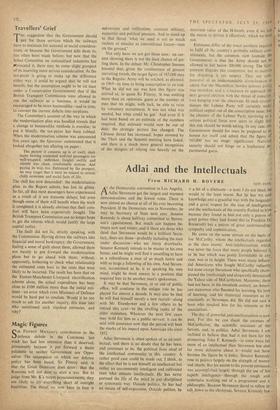Travellers' Grief
THE suggestion that the Government should pay for those services which the railways have to maintain for national or social considera- tions, or because the Government tells them to, \has often been made before; but now that the Select Committee on nationalised industries has rAlvocated it, there may be some slight prospect of its receiving more serious consideration. As the tax-payer is going to make up the difference either way, it could be argued that he will not benefit; byt the assumption ought to be (at least under a Conservative Government) that if the British Transport Commission were allowed to run the railways as a business, it would be encouraged to be more businesslike—and in time, to convert the current deficits into surpluses.
The Committee's account of the way in which the modernisation plan was handled reveals that a change to businesslike methods is overdue; to put it bluntly, the tax-payer has been robbed. When the modernisation scheme was announced five years ago, the Spectator commented that it looked altogether too alluring on paper: The picture it conjures up is of swift, sleek trains bearing contented well-fed passengers (or well-wrapped, unbroken freight) swiftly and silently into clean, comfortable stations. And paying its way, too. Entranced by the prospect. we may forget that it must be related to certain chilly economic and social facts of life.
The chill has now descended : the modernisation plan, as the Report admits, has lost its glitter. So far, all that most passengers have experienced as a result of it are tiresome delays; but even though some of them will benefit when the work is completed it is already obvious that their com- fort will have been expensively bought. The British Transport Commission can no longer hope to get the returns which would justify the large capital outlay.
The fault did not lie, strictly speaking, with the, Commission. Having driven the railways into financial and moral bankruptcy, the Government, feeling a sense of guilt about them, allowed them not merely to put forward •the modernisation plans but to go ahead with them; without, apparently, bothering to check what relationship the estimated costs bore to the costs that were likely to be incurred. The result has been that on the Euston-Manchester-Liverpool electrification scheme alone, the actual expenditure has been close to £100 million more than the initial esti- mate—an error which even Ministers of Defence would be hard put to emulate. Would it be too much to ask for another inquiry, this time into who sanctioned such slipshod estimates, and why?


































 Previous page
Previous page